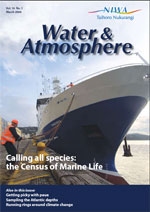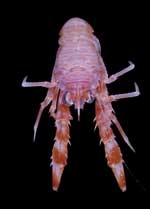PDF of this article (81 KB)

Workshops & symposia: New Zealand’s Non-Living Ocean Resources: New Frontiers and Challenges
1–2 May, Te Papa, Wellington, sponsored by NIWA and GNS Science
New Zealand is on the threshold of an unprecedented phase of exploration and development of non-living resources from the Exclusive Economic Zone and extended continental shelf. The area of the extended continental shelf is still subject to discussions with the UN and negotiations with adjacent states, but together these areas include an offshore region three-quarters the size of Australia. Research and high commodity prices have focused industry interest on seafloor mineral deposits and offshore petroleum exploration. Demand for renewable energy sources has prompted commercial interest indeveloping marine energy sources, including tides and waves. The exploration and development of such offshore resources will require, however, better assessments of biological diversity and vulnerability, and of the oceanographic environment.
The workshop will be of particular interest to mineral and petroleum exploration industries, marine energy industry, resource and environmental planners, and marine researchers.
- Day 1: potential wealth, geologic and legal setting of the EEZ, new research and industry initiatives in frontier hydrocarbon exploration (including gas hydrates) and seafloor mineral deposits
- Day 2: new research and pending initiatives in marine energy development, environmental management of the EEZ, and site-specific environmental studies.
For futher information, contact: Dr Ian Wright, 0-4-386 0322, [email protected]
Programme and registration details: www.niwascience.co.nz/ncco/workshops
A first for squat lobsters

Found in virtually all deepwatershelf habitats, including hydrothermal vents and seamounts, squat lobsters can be an important food source for deepwater fish. More than 800 species are known worldwide, and they are particularly abundant in the southwestern Pacific, including the waters around New Zealand.
Last September, NIWA hosted the First International Squat Lobster Workshop, which was sponsored by COMARGE, the Census of Marine Life on Continental Margins, one of 14 field projects of the Census of Marine Life. It was attended by taxonomists and students from Australia, Brazil, Colombia, Japan, Spain, Taiwan, and the US. NIWA specialists Shane Ahyong and Kareen Schnabel were among the participants.
The scientific knowledge of squat lobsters is voluminous, so the primary aims of the workshop were to assemble a database of all squat lobster species as well as comprehensive bibliographies, and to begin developing interactive identification keys. New species of squat lobster are being discovered regularly, and the outputs of the workshop should assist more rapid description and inventory. The workshop will, we hope, be a model for similar future projects.
For further information, contact: Dr Shane Ahyong, 0-4 386 0470, [email protected]
Further reading Schnabel, K.; Connell, A. (2007). Lobster à la carte. Water & Atmosphere 15(4): 16–17.
Ahyong, S.T. (2007). Decapod Crustacea collected by the NORFANZ Expedition from the northern Tasman Sea: Galatheidae and Polychelidae. Zootaxa 1393: 1–54.
Algae in a Changing World: Vth Asian Pacific Phycological Forum
10–14 November, Wellington, hosted by NIWA and Victoria University of Wellington
This triennial meeting of the Asian Pacific Phycology Association serves as a venue for information exchange, and to promote international cooperation, among algae specialists and societies in the region. In addition to workshops and group meetings, the forum will feature a series of mini symposia:
The deadline for submitting abstracts and for early-bird registration is 30 June.
For futher information about Teacher Fellows at NIWA, contact: Tracy Farr, 0-4-386 0601, [email protected]
Keep tabs on the conference and register at: www.appf2008.com
Training at NIWA
NIWA offers a wide range of courses each year. They are presented at a number of venues according to need and level of interest, and in some instances can include in-house training at your premises. Courses offered in the next six months include:
Accessing climate data and products, 4 April, Christchurch
Identifying marine macroalgae, 15–16 April, Wellington
Electric fishing for machine operators, 15–16 April, Christchurch
Optimising data quality from environmental monitoring stations,16 April, Christchurch
Electric fishing for machine operators, 22–23 April, Palmerston North
Advanced flow regime analysis, 6–8 May, Hamilton
Scientific diver training course, June (8 days), Rotorua
For further information, contact: NIWA Training Coordinator phone 0800 RING NIWA (0800 746 464) or email [email protected]
